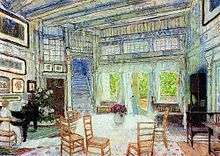The Lady from the Sea
| The Lady from the Sea | |
|---|---|
 | |
| Written by | Henrik Ibsen |
| Characters |
Ellida Wangel Dr Wangel The Stranger Hilde Wangel Bolette Wangel Arnholm Lyngstrand Ballestad |
| Date premiered | 12 February 1889 |
| Place premiered | Kristiania and Weimar (simultaneous Norwegian and German premieres) |
| Original language | Danish |
| Subject | Marriage, freedom |
| Genre | Drama |
| Setting | A town by a fjord |
The Lady from the Sea (Norwegian: Fruen fra havet) is a play written in 1888 by Norwegian playwright Henrik Ibsen inspired by the ballad Agnete og Havmanden.[1] The drama is notable in the Ibsen corpus for introducing the portrayal of Hilde Wangel who is again portrayed in Ibsen's later play The Master Builder. The character portrayal of Hilde Wangel has been portrayed twice in contemporary film as a culturally relevant portrayal, most recently in the 2014 film titled A Master Builder.
Characters
- Doctor Edvard Wangel
- Ellida Wangel, his second wife
- Bolette, his elder daughter from a previous marriage
- Hilde, her sister (in her teens)
- Arnholm, a private tutor
- Lyngstrand
- Ballested
- Stranger
Synopsis
This symbolic play is centred on a lady called Ellida. She is the daughter of a lighthouse-keeper, and grew up where the fjord met the open sea; she loves the sea. She is married to Doctor Wangel, a doctor in a small town in West Norway (in the mountains). He has two daughters (Bolette and Hilde) by his previous wife, now deceased. He and Ellida have a son who dies as a baby, which puts a big strain on their marriage. Wangel, fearing for Ellida’s mental health, has invited up Arnholm, Bolette’s former tutor and now the headmaster of a school in hope that he can help Ellida. However, Arnholm thinks that it is Bolette waiting for him and he proposes. She agrees to marry her former teacher because she sees this as her only opportunity to get out into the world.
Some years earlier Ellida was deeply in love and engaged to a sailor, but because he murdered his captain he had to escape. Nevertheless, he asked her to wait for him to come and fetch her. She tried to break the engagement, but he had too great a hold over her. The sailor then returns all these years later to claim her. Ellida then has to choose between her former lover or her husband. Dr Wangel finally recognizes her freedom to choose since he understands that he has no other options. This goes in his favour as she then chooses him. The play ends with the sailor leaving and Ellida and Wangel taking up their lives again together.
Adaptations
- Kvinnan från havet (The Woman from the Sea) is a ballet by choreographer Birgit Cullberg, and based on Ibsen's play. The ballet was premiered at the Royal Opera, Stockholm, with ballerina and actress Kari Sylwan in the title role.
- Vom Meer. Opera with music by Alexander Muno and a libretto by Francis Hüsers. World premiere: 29 April 2011, Opernzelt, Heidelberg
- The Lady from the Sea. Opera by Craig Armstrong (music) and Zoë Strachan (libretto). World premiere: 29 August 2012, Edinburgh International Festival
- The Lady from the Sea, a BBC Radio 3 adaptation by Frank McGuinness and starring Lia Williams as Ellida, originally broadcast on 1 November 2009 and re-broadcast on 3 May 2015.[2]
References
- ↑ Per Schelde Jacobsen and Barbara Fass Leavy, Ibsen's Forsaken Merman: Folklore in the Late Plays (New York: New York University Press, 1988).
- ↑ http://www.bbc.co.uk/programmes/b00nkx97#auto
External links
- The Lady from the Sea at Project Gutenberg
-
 The Lady from the Sea public domain audiobook at LibriVox
The Lady from the Sea public domain audiobook at LibriVox - Summary and Characters at Ibsen.net